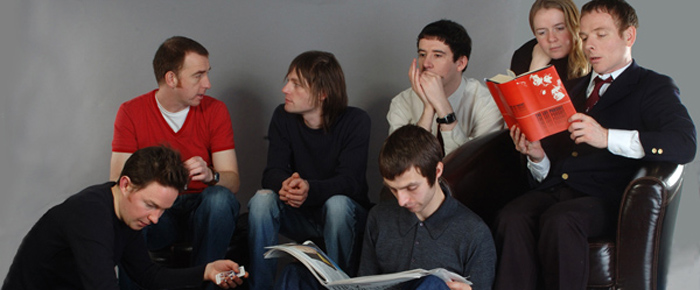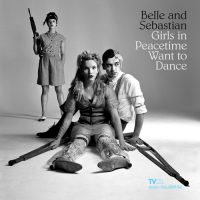
By Eleni P. Austin
Belle And Sebastian have been making a very specific style of rainy day music for nearly 20 years. Hushed and delicate, their songs have provided a soundtrack for sad-eyed hipsters since 1996.
The brainchild of Stuart Murdoch, the band began as a school project during the years he was taking a music business course at University in Glasgow. He decided to form a band for his final class assignment.
He recruited seven players from the local café scene, Chris Geddes on keys, violinist Sarah Martin, guitarist Stevie Jackson, bassist Stuart David, drummer Richard Coburn and cellist Isobel Campbell. Murdoch wrote all the songs. The plan was to record two albums and break up.
Murdoch christened the band Belle And Sebastian, after a series of French children’s books. Their first album, Tiger Milk was recorded in three days and released through the University’s in-house record label, Electric Honey. The initial pressing of 1,000 quickly sold out.
Buoyed by the album’s warm reception, the band signed with Jeepster Records in the U.K. and recorded a follow-up, If You’re Feeling Sinister in 1996. It was a critical and commercial success. The melodies were delicate and ethereal, grounded by Murdoch’s droll vocals and wry observations. If Kinks leader, Ray Davies fronted the Smiths, it might have sounded like this.
Belle And Sebastian inked a deal with America’s premiere indie label, Matador and the music arrived at a furious pace. Every two years a new album with a suitably cryptic title would arrive; The Boy With The Arab Strap in 1998, Fold Your Hands Child, You Walk Like A Peasant in 2000 and Storytelling, (a musical companion to Todd Solondz’s film of the same name), in 2002.
Although the band’s sound remained the same, Stuart David and Isobel Campbell had each left the band by 2002, to pursue their own projects. Belle And Sebastian hit their commercial peak in 2003 when they collaborated with producer Trevor Horn on their Dear atastrophe Waitress album.
Horn is best known as the man behind the band Buggles. Not only was their song, “Video Killed The Radio Star” weirdly prophetic, it was also the first video played on MTV in 1981. Horn has gone on to produce everyone from ABC to Paul McCartney to Yes. The album was a sharp blend of kaleidoscopic hooks and vivid storytelling.
The band pressed on, releasing The Life Pursuit in 2006 and Belle And Sebastian Write About Love in 2010. After a five year hiatus they have taken a sharp left turn with their new record Girls In Peacetime Want To Dance.
The album opens with the hushed quietude of “Nobody’s Empire.” The instrumentation is all plinky piano and sibilant synths, lush and plangeant. Stuart Murdoch’s vocals remain whimsical, his lyrics rich in detail. In short, everything one expects from a Belle And Sebastian record. But as Murdoch notes, it’s the “quiet before the madness.”
The album is oddly bi-polar. A queer collision of their patented Chamber Pop and clangorous early ‘80s Disco. It’s as though this band exchanged their corduroys and wool jumpers for Sergio Valente jeans and sequined, satin blouses and jumped into the Way Back Machine headed for 1982.
The mix and match begins slowly. “Allie” feels comfortingly like vintage B&S, blending jangly guitars, skittery percussion and mordant lyrics admonishing a young girl intent on growing up too quickly.
The Disco tracks, “The Party Line,” “The Power Of Three,” “Enter Sylvia Plath” and “Play For Today” are spread across the record. The least they could do would be to lump them all together so the listener could take their musical medicine all at once, or skip them, en masse.
“The Party Line” isn’t too bad. Bubbling bass lines, percolating percussion and Chic-style guitars crackle with good cheer. But to paraphrase Sonny And Cher, “the beat goes on, (far too long).”
Sweet-sour vocals, from Sarah Martin, a click-track rhythm and airy guitars anchor “The Power Of Three.” The lyrics are a numerological hodge-podge that reference Sherlock Holmes and the Three Musketeers.
Abba-On-Amphetamines is the best way to describe “Enter Sylvia Plath.” Despite the dour title, this tune is powered by galloping synths, treacle-y keys, and spoken word declaration. It’s all much too perky.
“Play For Today” is overwrought on every level. The melody and instrumentation feel like a weird mutation between “Xanadu” soundtrack and those chirpy “Mentos” commercials from the ‘90s. Murdoch shares vocal duties with Dee Dee Penny from the Dum Dum Girls, commiserating over life’s inequities.
The lyrics are a fat fucking downer. “Life is a secret, death is a myth, love is a fraud/It’s misunderstood, work is a sentence, family’s a drag, this house is a trap.” Plus the song is nearly seven minutes long. Eeesh!
Girls In Peacetime… is at its most schizophrenic on “The Everlasting Muse.” The song opens with promise, slinky bass lines lock into a sly Bossa Nova groove, feeling like the theme from a sexy, ‘60s spy caper. But two minutes in, the song suddenly tilts on its axis, morphing into a “Those Were The Days” style sing-a-long. Then it shifts again accenting the Spy melody with prickly guitar riffs and bullfighter trumpet trills. Then back again to the over-enthusiastic cheery British Music Hall chant. It’s exhausting.
Both “The Cat With The Cream” and “Ever Have A Little Faith” are more in the Belle And Sebastian wheelhouse. The former weds a willowy string section to a languid melody and lyrics that offer a quiet meditation on mortality. The latter is a mid-tempo quest for spirituality and sanity.
Other interesting tracks include “Perfect Couples.” Blending Afro-Pop rhythms, angular guitars and deadpan vocals, it feels like a mash up between the Talking Heads and Haircut 100. Meanwhile, the superball bounce of “Book Of You” is tempered by some skronky guitar fills that dirty up the pretty.
The album closes with wistful “Today (This Army’s For Peace).” Lilting and pastoral, it shares musical DNA with the Monkees’ late period masterpiece “The Porpoise Song.”
This would all be easier to dismiss if the entire album was crap, but there are glimmers of the beloved Belle And Sebastian sound in the midst of the Disco dross. Maybe they’re just experiencing growing pains, but at nearly 20 years old, the band should be well past their musical puberty.
As it stands, Girls In Peacetime Want To Dance will probably go down in musical history as the UN-Funkiest White Boy music ever.














































